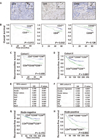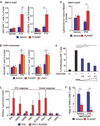Leukocyte complexity predicts breast cancer survival and functionally regulates response to chemotherapy
- PMID: 22039576
- PMCID: PMC3203524
- DOI: 10.1158/2159-8274.CD-10-0028
Leukocyte complexity predicts breast cancer survival and functionally regulates response to chemotherapy
Abstract
Immune-regulated pathways influence multiple aspects of cancer development. In this article we demonstrate that both macrophage abundance and T-cell abundance in breast cancer represent prognostic indicators for recurrence-free and overall survival. We provide evidence that response to chemotherapy is in part regulated by these leukocytes; cytotoxic therapies induce mammary epithelial cells to produce monocyte/macrophage recruitment factors, including colony stimulating factor 1 (CSF1) and interleukin-34, which together enhance CSF1 receptor (CSF1R)-dependent macrophage infiltration. Blockade of macrophage recruitment with CSF1R-signaling antagonists, in combination with paclitaxel, improved survival of mammary tumor-bearing mice by slowing primary tumor development and reducing pulmonary metastasis. These improved aspects of mammary carcinogenesis were accompanied by decreased vessel density and appearance of antitumor immune programs fostering tumor suppression in a CD8+ T-cell-dependent manner. These data provide a rationale for targeting macrophage recruitment/response pathways, notably CSF1R, in combination with cytotoxic therapy, and identification of a breast cancer population likely to benefit from this novel therapeutic approach.
Significance: These findings reveal that response to chemotherapy is in part regulated by the tumor immune microenvironment and that common cytotoxic drugs induce neoplastic cells to produce monocyte/macrophage recruitment factors, which in turn enhance macrophage infiltration into mammary adenocarcinomas. Blockade of pathways mediating macrophage recruitment, in combination with chemotherapy, significantly decreases primary tumor progression, reduces metastasis, and improves survival by CD8+ T-cell-dependent mechanisms, thus indicating that the immune microenvironment of tumors can be reprogrammed to instead foster antitumor immunity and improve response to cytotoxic therapy.
Conflict of interest statement
Disclosure of Potential Conflicts of Interest
E. Rexhepaj, D.J. Brennan, and W.M. Gallagher are inventors of a pending patent application in relation to the development of novel automated image analysis approaches in histopathology, and D.G. DeNardo, D.J. Brennan and L.M. Coussens are inventors of a pending patent application in relation to immune-based signatures for predicting breast cancer risk. B.L. West is an employee of Plexxikon Inc. but had no involvement in data collection, analysis, or interpretation.
Figures







Similar articles
-
CSF1/CSF1R blockade reprograms tumor-infiltrating macrophages and improves response to T-cell checkpoint immunotherapy in pancreatic cancer models.Cancer Res. 2014 Sep 15;74(18):5057-69. doi: 10.1158/0008-5472.CAN-13-3723. Epub 2014 Jul 31. Cancer Res. 2014. PMID: 25082815 Free PMC article.
-
CSF1/CSF1R Signaling Inhibitor Pexidartinib (PLX3397) Reprograms Tumor-Associated Macrophages and Stimulates T-cell Infiltration in the Sarcoma Microenvironment.Mol Cancer Ther. 2021 Aug;20(8):1388-1399. doi: 10.1158/1535-7163.MCT-20-0591. Epub 2021 Jun 4. Mol Cancer Ther. 2021. PMID: 34088832 Free PMC article.
-
TH2-Polarized CD4(+) T Cells and Macrophages Limit Efficacy of Radiotherapy.Cancer Immunol Res. 2015 May;3(5):518-25. doi: 10.1158/2326-6066.CIR-14-0232. Epub 2015 Feb 25. Cancer Immunol Res. 2015. PMID: 25716473 Free PMC article.
-
Targeting the CSF1/CSF1R signaling pathway: an innovative strategy for ultrasound combined with macrophage exhaustion in pancreatic cancer therapy.Front Immunol. 2024 Oct 2;15:1481247. doi: 10.3389/fimmu.2024.1481247. eCollection 2024. Front Immunol. 2024. PMID: 39416792 Free PMC article. Review.
-
CSF-1/CSF-1R targeting agents in clinical development for cancer therapy.Curr Opin Pharmacol. 2015 Aug;23:45-51. doi: 10.1016/j.coph.2015.05.008. Epub 2015 Jun 4. Curr Opin Pharmacol. 2015. PMID: 26051995 Review.
Cited by
-
SNPs in the interleukin-12 signaling pathway are associated with breast cancer risk in Puerto Rican women.Oncotarget. 2020 Sep 15;11(37):3420-3431. doi: 10.18632/oncotarget.27707. eCollection 2020 Sep 15. Oncotarget. 2020. PMID: 32973967 Free PMC article.
-
Hyaluronan, Inflammation, and Breast Cancer Progression.Front Immunol. 2015 Jun 8;6:236. doi: 10.3389/fimmu.2015.00236. eCollection 2015. Front Immunol. 2015. PMID: 26106384 Free PMC article. Review.
-
Organ-Specific Immune Setpoints Underlie Divergent Immune Profiles across Metastatic Sites in Breast Cancer.Cancer Immunol Res. 2024 Nov 4;12(11):1559-1573. doi: 10.1158/2326-6066.CIR-23-0718. Cancer Immunol Res. 2024. PMID: 39051632
-
Non-apoptotic routes to defeat cancer.Oncoimmunology. 2012 Jan 1;1(1):94-96. doi: 10.4161/onci.1.1.17885. Oncoimmunology. 2012. PMID: 22720222 Free PMC article.
-
Macrophage-produced IL-10 limits the chemotherapy efficacy in breast cancer.J Zhejiang Univ Sci B. 2015 Jan;16(1):44-5. doi: 10.1631/jzus.B1400352. J Zhejiang Univ Sci B. 2015. PMID: 25559954 Free PMC article. No abstract available.
References
-
- Tang R, Beuvon F, Ojeda M, Mosseri V, Pouillart P, Scholl S. M-CSF (monocyte colony stimulating factor) and M-CSF receptor expression by breast tumour cells: M-CSF mediated recruitment of tumour infiltrating monocytes? J Cell Biochem. 1992;50:350–356. - PubMed
Publication types
MeSH terms
Substances
Grants and funding
- R01CA130980/CA/NCI NIH HHS/United States
- R01 CA132566/CA/NCI NIH HHS/United States
- R01 CA130980-04/CA/NCI NIH HHS/United States
- R01CA140943/CA/NCI NIH HHS/United States
- R01 CA130980/CA/NCI NIH HHS/United States
- R01 CA130980-02/CA/NCI NIH HHS/United States
- R01 CA130980-01A1/CA/NCI NIH HHS/United States
- R01 CA130980-03/CA/NCI NIH HHS/United States
- P50CA58207/CA/NCI NIH HHS/United States
- R01CA132566/CA/NCI NIH HHS/United States
- R01 CA140943/CA/NCI NIH HHS/United States
- P50 CA058207/CA/NCI NIH HHS/United States
LinkOut - more resources
Full Text Sources
Other Literature Sources
Medical
Molecular Biology Databases
Research Materials
Miscellaneous

